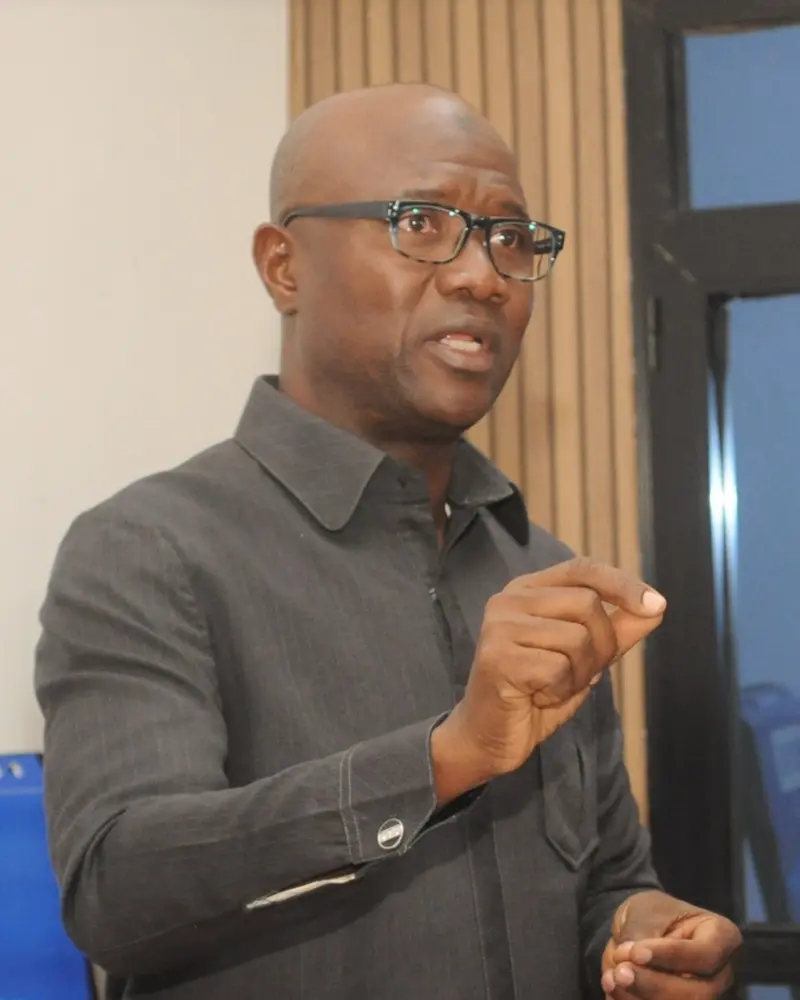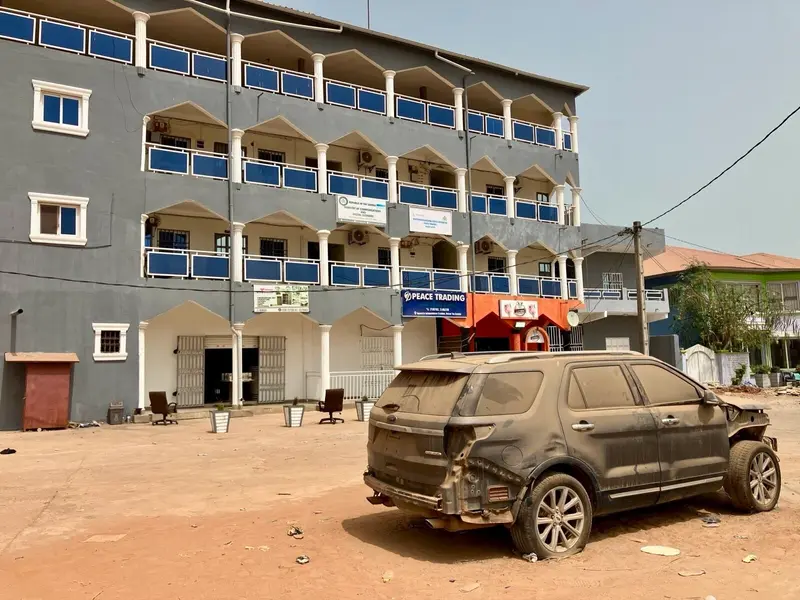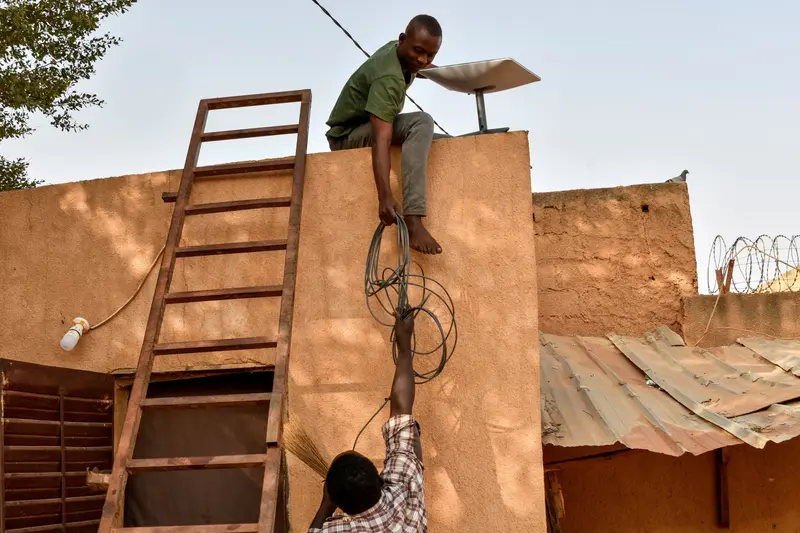Reporting Highlights
- “Maximum Pressure”: The State Department conducted a monthslong campaign to push a small African country to help Musk’s satellite internet company, records and interviews show.
- “Ram This Through”: Working closely with executives at Starlink, the U.S. government has made a global push to help expand Musk’s business empire in the developing world.
- “Crony Capitalism”: Diplomats said the events were an alarming departure from standard practice — because of both the tactics used and the person who would benefit most from them.
These highlights were written by the reporters and editors who worked on this story.
In early February, Sharon Cromer, U.S. ambassador to Gambia, went to visit one of the country’s Cabinet ministers at his agency’s headquarters, above a partially abandoned strip mall off a dirt road. It had been two weeks since President Donald Trump took office, and Cromer had pressing business to discuss. She needed the minister to fall in line to help Elon Musk.
Starlink, Musk’s satellite internet company, had spent months trying to secure regulatory approval to sell internet access in the impoverished West African country. As head of Gambia’s communications ministry, Lamin Jabbi oversees the government’s review of Starlink’s license application. Jabbi had been slow to sign off and the company had grown impatient. Now the top U.S. government official in Gambia was in Jabbi’s office to intervene.
Musk’s Department of Government Efficiency loomed over the conversation. The administration had already begun freezing foreign aid projects, and early in the meeting, Cromer, a Biden appointee, said something that rattled Gambian officials in the room. She listed the ways that the U.S. was supporting the country, according to two people present and contemporaneous notes, noting that key initiatives — like one that funds a $25 million project to improve the electrical system — were currently under review.
Jabbi’s top deputy, Hassan Jallow, told ProPublica he saw Cromer’s message as a veiled threat: If Starlink doesn’t get its license, the U.S. could cut off the desperately needed funds. “The implication was that they were connected,” Jallow said.
In recent months, senior State Department officials in both Washington and Gambia have coordinated with Starlink executives to coax, lobby and browbeat at least seven Gambian government ministers to help Musk, records and interviews show. One of those Cabinet officials told ProPublica his government is under “maximum pressure” to yield.
In mid-March, Cromer escalated the campaign by writing to Gambia’s president with an “important request.” That day, a contentious D.C. meeting between Musk employees and Jabbi had ended in an impasse. She urged the president to circumvent Jabbi and “facilitate the necessary approvals for Starlink to commence operations,” according to a copy of the letter obtained by ProPublica. Jabbi told confidantes he felt the ambassador was trying to get him fired.


Credit:
Via the Facebook pages of Gambia’s Ministry of Communications and Digital Economy, and the U.S. Embassy in Banjul, Gambia
The saga in Gambia is the starkest known example of the Trump administration wielding the U.S. government’s foreign policy apparatus to advance the business interests of Musk, a top Trump adviser and the world’s richest man.
Since Trump’s inauguration, the State Department has intervened on behalf of Starlink in Gambia and at least four other developing nations, previously unreported records and interviews show.
As the Trump administration has gutted foreign aid, U.S. diplomats have pressed governments to fast-track licenses for Starlink and arranged conversations between company employees and foreign leaders. In cables, U.S. officials have said that for their foreign counterparts, helping Starlink is a chance to prove their commitment to good relations with the U.S.
In one country last month, the U.S. embassy bragged that Starlink’s license was approved despite concerns it wasn’t abiding by rules that its competitors had to follow.
“If this was done by another country, we absolutely would call this corruption,” said Kristofer Harrison, who served as a high-level State Department official in the George W. Bush administration. “Because it is corruption.”
Helping U.S. businesses has long been part of the State Department’s mission, but former ambassadors said they sought to do this by making the positive case for the benefits of U.S. investment. When seeking deals for U.S. companies, they said they took care to avoid the appearance of conflicts or leaving the impression that punitive measures were on the table.
Ten current and former State Department officials said the recent drive was an alarming departure from standard diplomatic practice — because of both the tactics used and the person who would benefit most from them. “I honestly didn’t think we were capable of doing this,” one official told ProPublica. “That is bad on every level.” Kenneth Fairfax, a retired career diplomat who served as U.S. ambassador to Kazakhstan, said the global push for Musk “could lead to the impression that the U.S. is engaging in a form of crony capitalism.”
The Washington Post previously reported that Secretary of State Marco Rubio has instructed U.S. diplomats to help Starlink so it can beat its Chinese and Russian competitors. Multiple countries, including India, have sped up license approvals for Starlink to try to build goodwill in tariff negotiations with the Trump administration, the Post reported.
ProPublica’s reporting provides a detailed picture of what that push has looked like in practice. After Gambia’s ambassador to the U.S. declined an interview about Starlink — a topic seen as highly sensitive given Musk’s position — ProPublica reporters traveled to the capital, Banjul, to piece together the events. This account is based on internal State Department documents and interviews with dozens of current and former officials from both countries, most of whom requested anonymity for fear of retaliation.
In response to detailed questions, the State Department issued a statement celebrating Starlink. “Starlink is an America-made product that has been a game changer in helping remote areas around the world gain internet connectivity,” a spokesperson wrote. “Any patriotic American should want to see an American company’s success on the global stage, especially over compromised Chinese competitors.” Cromer and Starlink did not respond to requests for comment, nor did the office of the president of Gambia. Jabbi made Jallow available to discuss the situation.
During the Biden administration, State Department officials worked with Starlink to help the company navigate bureaucracies abroad. But the agency’s approach appears to have become significantly more aggressive and expansive since Trump’s return to power, according to internal records and current and former government officials.
Foreign leaders are acutely aware of Musk’s unprecedented position in the government, which he has used to help rewrite U.S. foreign policy. After Musk spent at least $288 million on the 2024 election, Trump gave the billionaire a powerful post in the White House. In mere months, Musk’s team has directed the firing of thousands of federal workers, canceled billions of dollars in programs and dismantled the U.S. Agency for International Development, which supported humanitarian projects around the world. African nations have been particularly hard-hit by the cuts.
At the same time, Musk continues to run Starlink and the rest of his corporate empire. In past administrations, government ethics lawyers carefully vetted potential conflicts of interest. Though Trump once said that “we won’t let him get near” conflicts, the White House has also suggested Musk is responsible for policing himself. The billionaire has waved away criticisms of the arrangement, saying “I’ll recuse myself” if conflicts arise. “My companies are suffering because I’m in the government,” Musk said.
In a statement, the White House said Musk has nothing to do with deals involving Starlink and that every administration official follows ethical guidelines. “For the umpteenth time, President Trump will not tolerate any conflicts of interest,” spokesperson Harrison Fields said in an email.
Executives at Starlink have seized the moment to expand. An April State Department cable to D.C. obtained by ProPublica quoted a Starlink employee describing the company’s approach to securing a license in Djibouti, a key U.S. ally in Africa that hosts an American military base: “We’re pushing from the top and the bottom to ram this through.”

Credit:
Brett Murphy/ProPublica
Musk entered the White House at a pivotal moment for Starlink. When the service launched in 2020, it had a novel approach to internet access. Rather than relying on underground cables or cell towers like traditional telecom companies, Starlink uses low-orbiting satellites that let it provide fast internet in places its competitors had struggled to reach. Expectations for the startup were sky high. Bullish Morgan Stanley analysts predicted that by 2040, Starlink would have up to 364 million subscribers worldwide — more than the current population of the U.S.
Starlink quickly became a central pillar of Musk’s fortune. His stake in Starlink’s parent company, SpaceX, is estimated to be worth about $150 billion of his roughly $400 billion net worth.
Although the company says its user base has grown to over 5 million people, it remains a bit player compared to the largest internet providers. And the satellite internet market is set to become more competitive as well-funded companies launch services modeled on Starlink. Jeff Bezos’ Project Kuiper, a unit of Amazon, has said it expects to start serving customers later this year. Satellite upstarts headquartered in Europe and China aren’t far behind either.
“They want to get as far and as fast as they can before Amazon Kuiper gets online,” said Chris Quilty, a veteran space industry analyst.
In internal cables, State Department officials have said they are eager to help Musk get ahead of foreign satellite companies. Securing licenses in the next 18 months is critical for Starlink due to the growing competition, one cable said last month. Senior diplomats have written that they hope to give Musk’s company a “first-mover advantage.”
Africa represents a lucrative prize. Much of the continent lacks reliable internet. Success in Africa could mean dominating a market with the fastest-growing population on earth.

Credit:
Boureima Hama/AFP/Getty Images
As of last November, Starlink had reportedly launched in 15 of Africa’s 54 countries, but it was beginning to spark a backlash. Last year, Cameroon and Namibia cracked down on Musk’s company for allegedly operating in their countries illegally. In South Africa — where Starlink has so far failed to get a license — Musk exacerbated tensions by publicly accusing the government of anti-white racism. Since Trump won the election, at least five African countries have granted licenses to Starlink: the Democratic Republic of Congo, Somalia, Guinea-Bissau, Lesotho and Chad.
Now Musk’s campaign of cuts has given him leverage inside the State Department. A Trump administration memo that leaked to the press last month proposed closing six embassies in Africa.
The Gambian embassy was on the list of proposed cuts.
An 8-year-old democracy, Gambia’s 2.7 million residents live on a sliver of land once used as a hub in the transatlantic slave trade. For two decades until 2017, the nation was ruled by a despot who had his opponents assassinated and plundered public funds to buy himself luxuries like a Rolls-Royce collection and a private zoo. When the dictator was ousted, the economy was in tatters. Today Gambia is one of the poorest countries in the world, with about half the country living on less than $4 a day.
In this fragile environment, the telecom industry that Jabbi oversees is vitally important to Gambian authorities. According to the government, the sector provides at least 20% of the country’s tax revenue. Ads for the country’s multiple internet providers are ubiquitous, painted onto dozens of public works — parks, police booths, schools.
It’s unclear why Starlink’s efforts in Gambia, a tiny market, have been so intense.

Credit:
Muhamadou Bittaye/AFP/Getty Images
Cromer’s efforts on behalf of the company started under the Biden administration, as she documented last December in a cable sent back to Washington. Last spring, Starlink began the process of securing necessary approvals from a local utilities regulator and the Gambian communications agency. The utilities regulator wanted Starlink to pay an $85,000 license fee, which the company felt was too expensive. Cromer spoke to local officials, who then “pressured” the regulator to remove “this unnecessary barrier to entry,” the ambassador wrote.
Gambian supporters of Starlink felt that its product would be a boon for consumers and for economic growth in the country, where internet service remains unreliable and slow. “The ripple effects could be extraordinary,” Cromer said in the December cable, contending it could enable telehealth and improve education.
Opponents argued that local internet providers were one of Gambia’s few stable sources of jobs and infrastructure investments. If Starlink killed off its competition and then jacked up its prices — in Nigeria, the company announced last year it would suddenly double its fees — authorities could have little leverage to manage the fallout. When Musk refused to turn on Starlink in part of Ukraine during the war there, it heightened concerns about handing control of internet access to the mercurial billionaire, industry analysts said. One Musk tweet about foreign regulators’ ability to police his company caught the attention of Gambian critics: “They can shake their fist at the sky,” Musk said in 2021.
The ultimate authority for granting Starlink a license lies with Jabbi, an attorney who spent years in the local telecom sector. Gambian telecom companies that don’t want competition from Musk see Jabbi as an ally.
Jallow, Jabbi’s top deputy, told ProPublica that the ministry is not opposed to Starlink operating in Gambia. But he said Jabbi is doing due diligence to ensure laws and regulations are being followed before opening up the country to a consequential change.
After Trump’s inauguration, Jabbi’s position pitted him against not only Starlink but also the U.S. government. In the weeks after the February meeting where Cromer reminded Jabbi about the tenuous state of American funding to his country, the ambassador told other diplomats that getting Starlink approved was a high priority, according to a Western official familiar with her comments.
The stance surprised some of Cromer’s peers. Cromer had spent her career at USAID before President Joe Biden appointed her as ambassador. Her tenure in Gambia often focused on human rights and democracy building.
In March, when Jabbi and Jallow traveled to D.C. to attend a World Bank summit, the State Department helped arrange a series of meetings for them. The first, on March 19, was with Starlink representatives including Ben MacWilliams, a former U.S. diplomat who leads the company’s expansion efforts in Africa. The second was with U.S. government officials at the State Department’s headquarters.
The meeting with the company quickly became contentious. Huddled in a conference room at the World Bank, MacWilliams accused Jabbi of standing in the way of his nation’s progress and harming ordinary Gambians, according to Jallow, who was in the meeting, and four others briefed on the event. “We want our license now,” Jallow recalled MacWilliams saying. “Why are you delaying it?”
The conversation ended in a stalemate. In the hours that followed, Starlink and the U.S. government’s campaign intensified in a way that underscored the degree of coordination between the two parties. The company told Jabbi it would cancel his scheduled D.C. meeting with State Department officials because “there was no more need,” Jallow said.
The State Department meeting never happened. Instead, 4,000 miles away in Gambia’s capital, Cromer would try an even more aggressive approach.
That same day, Cromer had already met with Gambia’s equivalent of a commerce secretary to lobby him to help pave the way for Starlink. Then she was informed about the disappointing meeting Starlink had had in D.C., according to State Department records. By day’s end, Cromer had sent a letter to the nation’s president.
“I am writing to seek your support to allow Starlink to operate in The Gambia,” the letter opened. Over three pages, the ambassador described her concerns about Jabbi’s agency and listed the ways that Gambians could benefit from Starlink. She also said the company had satisfied conditions set by Jabbi’s predecessor.
“I respectfully urge you to facilitate the necessary approvals for Starlink to commence operations in The Gambia,” Cromer concluded. “I look forward to your favorable response.”
In the weeks since, Jabbi has refused to budge. The U.S. government’s efforts have continued. In late April, Gambia’s attorney general met in D.C. with senior State Department officials, according to a person familiar with the matter, where they again discussed the Starlink issue.
Diplomats were troubled by how the pressure campaign could hurt America’s image overseas. “This is not Iran or a rogue African state run by a dictator — this is a democracy, a natural ally,” said another senior Western diplomat in the region, noting that Gambia is “a prime partner of the West” in United Nations votes. “You beat up the smallest and the best boy in the class.”
Gambia is not the only country being leaned on. Since Trump took office, embassies around the world have sent a flurry of cables to D.C. documenting their meetings with Starlink executives and their efforts to cajole developing countries into helping Musk’s business. The cables all describe a problem similar to what happened in Gambia: The company has struggled to win a license from local regulators. In some countries, ambassadors reported, their work appears to be yielding results. (The embassies and their host countries did not respond to requests for comment.)
The U.S. embassy in Cameroon wrote that the country could prove its commitment to Trump’s agenda by letting Starlink expand its presence there. In the same missive, embassy officials discussed the impact of U.S. aid cuts and deportations and cited a humanitarian official who was reckoning with America’s shifting foreign policy: “They may not be happy with what they see, but they are trying to adapt as best they can.”
In Lesotho, where embassy officials had spent weeks trying to help Starlink get a license, the company finalized a deal after Trump imposed 50% tariffs on the tiny landlocked country. Lesotho officials told embassy staff they hoped the license would help in their urgent push to reduce the levies, according to Mother Jones. A major multinational company complained that Starlink was getting preferential treatment, embassy documents obtained by ProPublica show, since Musk’s firm had been exempted from requirements its competitors still had to follow.
In cables sent from the U.S. embassy in Djibouti this spring, State Department officials recounted their meetings with the company and pledged to continue working with “Starlink in identifying government officials and facilitating discussions.”
In Bangladesh, U.S. diplomats pressed Starlink’s case “early and often” with local officials, partnered with Starlink to “build an educational strategy” for their counterparts and helped arrange a conversation between Musk and the nation’s head of state, according to a recent cable. The embassy’s work started under Biden but bore fruit only after Trump took office.
Their efforts resulted in Bangladesh approving Starlink’s request to do business in the country, the top U.S. diplomat there said last month, a sign-off that Musk’s company had sought for years.
Do you have information about Elon Musk’s businesses or the Trump administration? Josh Kaplan can be reached by email at [email protected] and by Signal or WhatsApp at 734-834-9383. Brett Murphy can be reached at 508-523-5195 or by email at [email protected].
Anna Maria Barry-Jester contributed reporting.

